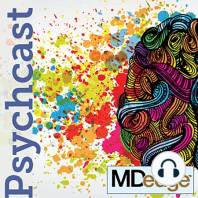12 min listen

Dr. Dorothy Lewis of 'Interview with a Serial Killer' and 'Crazy, Not Insane' on a lifetime in psychiatry
FromPsychcast
Dr. Dorothy Lewis of 'Interview with a Serial Killer' and 'Crazy, Not Insane' on a lifetime in psychiatry
FromPsychcast
ratings:
Length:
56 minutes
Released:
Jan 20, 2021
Format:
Podcast episode
Description
Guest host Eva Ritvo, MD, interviews Dorothy Otnow Lewis, MD, about her more than 40-year career in studying death row inmates as examined in the HBO documentary “Crazy, Not Insane.” Dr. Lewis is clinical professor of psychiatry at Yale University, New Haven, Conn. She has no disclosures. Dr. Ritvo is a psychiatrist in private practice in Miami Beach, Fla. She has no disclosures. Take-home points Dr. Lewis has an extensive archive of taped interviews with death row inmates that she has used to inform her work as an expert witness. While doing her child psychiatry training at the Yale Child Study Center and sitting in at the juvenile court, she began to see that some of the children had psychiatric and neurologic problems that had not been addressed. The parents of these children sometimes had psychotic or bipolar disorders. After seeing these themes, Dr. Lewis started a clinic at the court. Dr. Lewis and her team were able to study approximately 15 inmates in four states, including Texas and Florida, both of which had the greatest number of condemned juveniles. One key theme that emerged is that all of the inmates had been sentenced to death as juveniles. Eventually, the Supreme Court ended the death penalty for convicted killers who committed their crimes before age 18. Digging deeper and asking more questions of child and adolescent patients who commit violent acts can help clinicians identify environmental stressors that might underlie behavior that is aggressive and antisocial. In some cases, the psychiatric and neurologic impairments identified are treatable. Dr. Lewis would like to study whether identifying child abuse early might prevent future violence. References Yaeger CA, Lewis DO. Mental illness, neuropsychologic deficits, child abuse and violence. Child Adolesc Psychiatr Clin N Am. 2009;(4):793-813. Lewis DO. Ethical Implications of what we know about violence. Child Adolesc Psychiatr Clin N Am. 2000 Oct 9(4):833-91. Lewis DO et al. Ethics questions raised by the neuropsychiatric, neuropsychological, educational, developmental, and family characteristics of 18 juveniles awaiting execution in Texas. J Am Acad Psychiatry Law. 2004;32(4):408-29. Griffith EEH et al. Re: Ethics questions raised by characteristics of 18 juveniles awaiting execution in Texas. J Am Acad Psychiatry Law. 2006;34(2):143-4. Lewis DO et al. Some evidence of race bias in the diagnosis and treatment of the juvenile offender. Am J Orthopsychiatry. 1979 Jan;49(1):53-61. Lewis DO. Guilty by Reason of Insanity: A Psychiatrist Explores the Minds of Killers. New York: Fawcett Columbine, 1998. Roper v. Simmons, 543 U.S. 551 (2005). Thompson v. Oklahoma, 487 U.S. 815 (1988) . For more MDedge Podcasts, go to mdedge.com/podcasts Email the show: podcasts@mdedge.com
Released:
Jan 20, 2021
Format:
Podcast episode
Titles in the series (100)
Charles L. Raison: Ketamine and PTSD: How can ketamine or other psychedelic drugs impact some mental illnesses? by Psychcast